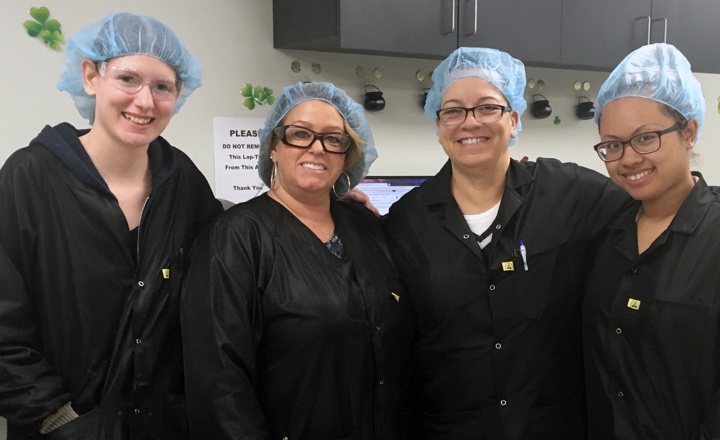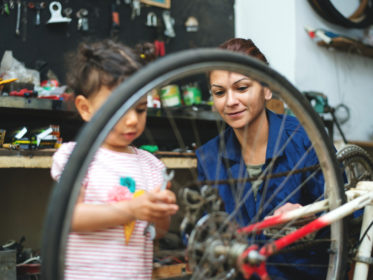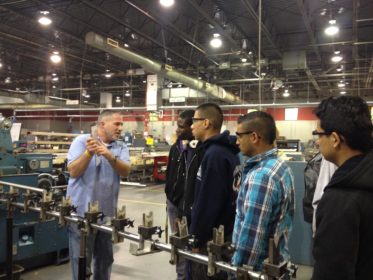
I had the opportunity to sit down with four women in production at Appli-Tec, manufacturers of pre-mixed and frozen speciality adhesives for industrial applications. I wanted to know why the women had chosen to work in manufacturing, as well as some of the challenges and opportunities they’ve encountered.
The four women I spoke with ranged in age from mid-twenties to early fifties and each one had a unique story to tell. What I learned is that manufacturing jobs offer fantastic opportunities for women that allow them to use multiple skills and talents.
With that, I’ll let the women speak for themselves.
How long have you been in manufacturing and why did you make the decision to pursue a manufacturing career?
Maria: I fell into manufacturing while still in high school. I was looking at the job board and wanted a job with higher pay. I found a metal finishing job that paid $15 an hour (and this was 20 years ago!), so I showed up, interviewed, and got the job.
Norma: I started off in my twenties making floppy disks at BASF. I needed a stable job with normal hours and benefits due to having a child; plus, my husband is a mason and his work is seasonal.
Kelly: I didn’t know anything about manufacturing before coming to work here at Appli-Tec. I’ve always done retail and was looking for office work. The staffing company told me about the job; Appli-Tec has provided on-the-job training.
Lena: This is my first full-time manufacturing job as well. Most of my experience is in customer service.
What was your perception of manufacturing before you began working in production?
Maria: My dad had a manufacturing job. He always had steady work and was able to provide what our family needed. That’s what made the biggest impression for me — that he always had a job.
Norma: I didn’t have a perception. I didn’t have a college degree and the QC job at BASF seemed easy. We also had lots of women working on the floor, so I never encountered a bias.
Kelly: My perception was that manufacturing involved sitting in the same spot doing “widget work.” My current job keeps me moving, plus I’ve learned new things.
Lena: My perception was that manufacturing was hostile to women, unsafe, and repetitive. That hasn’t been the case at all.
What challenge did you encounter, if any, when you first started, that you believe was due to you being a woman – and how did you solve it?
Maria: Being trained by men. I was young and they didn’t think I could do the job. I asked for the hardest job in the plant because I wanted to gain respect. I worked hard to get into positions where I was in charge. It was hard, but I did it. Today, supervising and managing are part of my skill set.
Kelly: I haven’t had any challenges due to being a woman. The culture here is very supportive.
What fresh perspective do you bring to your job and the work culture because you’re a woman? How do you think it positively impacts the company as a whole?
Lena: Women are detail-oriented, which allows us to perform better and provide higher quality work. Women are multi-taskers by nature due to managing a family and all that it entails.
Norma: I think women are able to talk to men personally whereas men won’t have the same types of conversation with other men. Having this sensitivity helps build trust.
Maria: Yes, I agree. Women are much more sensitive to people. I tell my team, “I’m here to help.”
How does the organizational culture support you in your job?
Maria: Appli-Tec encourages you to further your education. They provide tuition reimbursement for any college or online course as long as it applies to your job (and you get a passing grade). For example, I took an Excel course.
Norma: We always have a lot of fun events that bring everyone on the company together. For example, employee birthday lunches — events where we can blow off steam.
Maria: Yes! We had that virtual reality event that one of the new people attended. Because we were paired-up and had to work in a team setting, communication between the players was huge. The new person now feels much more comfortable with us and his team. That event really helped to improve communication and team building.
Last question – what do you think makes manufacturing a good choice for women?
Kelly: Manufacturing offers so many opportunities and you can go in different directions.
Norma: It’s not a job, it’s a career because you can work your way up. If you want to sustain yourself, manufacturing is a good place to start. It doesn’t take long to work your way into a good position. And, some places offer second shift – which lets you work after the kids come home from school or at night, so you and your husband can trade off on childcare.
Maria: You don’t need a college degree. You can come into a high tech company, receive on-the-job training, and get a good paying job.
Lena: With a manufacturing job, you know you’re making a real difference. The products we make go into aircraft or medical devices. Our work and attention to detail is very important.




